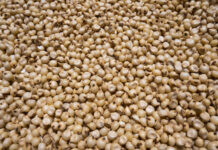ADM, a provider of sustainable nutrition solutions, creates and combines ingredients and flavors for food and beverages, supplements, and animal feed and has been working with smallholder farmers to develop a sustainable value chain.
Farmers, the company feels, have always been stewards of the environment but they need support to promote plant nutrition and growth as well as fight pests and weeds in new ways that support environmental health.
Amrendra Mishra, country manager of India and managing director of Oilseeds, ADM India, believes food is fundamental, and conventional farming focuses on maximizing crop yields to meet the nutritional needs of a rapidly growing global population.

“Industrialisation has led to the development and implementation of advanced machinery, such as tractors, harvesters, and irrigation systems. While these technologies have significantly increased the efficiency and productivity of agricultural operations, it has impacted the way food is produced. Farmers began to grow a single crop at a time to cultivate larger areas of land. This specialization allows crops to be harvested more quickly, resulting in economies of scale. With technological innovation, it has offered huge gains in efficiency and productivity by allowing farmers to mechanize farming practices and reducing the need for manual labor,” Mishra said.
Restoring ecosystems stores carbon and reverses climate change. There are several approaches applicable to different ecosystems, and all of these methods can show remarkable results. “Our goal is to help all farmers enhance the sustainability of their businesses.” Mishra says.
“Regenerative agriculture offers an alternative approach that aims to restore and regenerate ecosystems while maintaining long-term agricultural productivity. These practices nurture and restore soil health while protecting natural water resources and biodiversity. It adopts a rehabilitation and conservation approach by producing its inputs and managing its outputs in a closed-loop cycle, replenishing the natural resources used in the production of food. It also builds up organic soil matter to reduce the need for fertilizers and chemical pesticides and minimize disturbance to the soil. In the long term, it helps us fight the climate crisis by pulling carbon from the atmosphere and sequestering it in the ground.”
Regenerative agriculture practices are not a one-size-fits-all solution, and each unique context requires a different set of practices, depending on the conditions and culture of the land. Based on indigenous ways of land management, ADM focuses on five principles and practices in its regenerative farming efforts:
- Maintain living roots in the soil by using cover crops. Cover crops increase soil organic matter and improve soil fertility by capturing excess nutrients after a crop is harvested.
- Maximize diversity of crops, soil, and pollinators. Plant diversity helps to improve crop yields.
- Minimize soil disturbance through conservation tillage. Conservation tillage minimizes the frequency or intensity of tillage operations to promote certain economic and environmental benefits.
- Continuously cover bare soil with cover crops and no or low tilling. No or low-tilling techniques help farmers minimize soil disturbance by planting seeds directly into the soil from the previous crop while reducing the likelihood of soil erosion and increasing the amount of organic matter in the soil.
- Responsibly manage inputs such as fertilizers and pest control. Agriculture can contribute to nutrient pollution when fertilizer use, animal manure, and soil erosion are not managed responsibly.
ADM’s portfolio, which extends from farm to fork, places it in a position to influence and encourage sustainable practices throughout the agricultural value chain, according to Mishra,
“ADM first introduced its certified organic crop production program in India in 2018. To date, we have 6,000 farmers registered under the program and are looking to extend it to 25,000 over the next few years. ADM signed a memorandum of understanding with Bayer and Coromandel International Limited (Coromandel) last year to educate farmers on regenerative agriculture and implement sustainable practices at the farm level. As an example, the partnership with Coromandel aims to train some 25,500 local farmers through the ProTerra Foundation, a certification program that assures non-GMO quality and sustainable agriculture production.”
Mishra says that to tackle food crisis risks and increase food security, ADM always looks to expand its regenerative agriculture programs not only in India but across the world. “ADM partnered with farmers to implement pilot regenerative agriculture projects for several years before launching our ‘re:generations’ program in North America in 2022. Encouraged by the program’s success in its inaugural year, we set a goal to increase enrolment to 4 million acres globally by 2025.”
Commenting on the future of agriculture and ADM’s role in it, Mishra said, “We believe agriculture can meet both food security and sustainability needs and goals. Conventional farming has helped to maximize yields in the past few decades; our work is helping to maintain and expand those gains, while enhancing the sustainability of agriculture. To enable the transition to a global net-zero future and tackle food crisis risks, we need to adopt more sustainable practices to limit the negative impacts of agriculture on the environment.”
Regenerative agriculture offers numerous benefits to farmers, including improved soil health and fertility, climate change mitigation, biodiversity conservation, and more. By adopting sustainable practices at the farm level, farmers also contribute to the well-being of their local communities. Looking ahead, farmers who transition towards regenerative practices can create more sustainable and resilient agricultural systems to support food production for future generations.
IndiFoodBev — authentic, impactful and influential
An English-language food and beverage processing and packaging industry B2B platform in print and web, IndiFoodBev is in its third year of publication. It is said that the Indian food and beverage industries represent approximately US$ 900 billion in revenues which implies more than 20% of the country’s GDP. Eliminating the wastage on the farmside can help to deliver more protein to a higher number of the population apart from generating sizable exports. The savings in soil, seeds, water, fertilizer, energy and ultimately food and nutrition could be the most immense contribution that country is poised to make to the moderation of climate change.
To improve your marketing and grow sales to the food and beverage processing and packaging industry, talk to us. Our research and consulting company IppStar [www.ippstar.org] can assess your potential and addressable markets in light of the competition. We can discuss marketing, communication, and sales strategies for market entry and growth.
Suppliers and service providers with a strategy and budget for targeted marketing can discuss using our hybrid print, web, video, and social media channels to create brand recognition linked to market relevance. Our technical writers are ready to meet you and your customers for content.
The second largest producer of fruit and vegetables in the world is continuously expanding processing capacities and delivery systems with appropriate innovative technologies. We cover product and consumer trends, nutrition, processing, research, equipment and packaging from farm to thali. Get our 2025 media kit and recalibrate your role in this dynamic market. Enhance your visibility and relevance to existing markets and turn potential customers into conversations. Ask for a sample copy of our bi-monthly in print or our weekly IndiFoodBev eZine each Wednesday.
For editorial info@ippgroup.in — for advertisement ads1@ippgroup.in and for subscriptions subscription@ippgroup.in
Naresh Khanna – 10 February 2025
Subscribe Now











